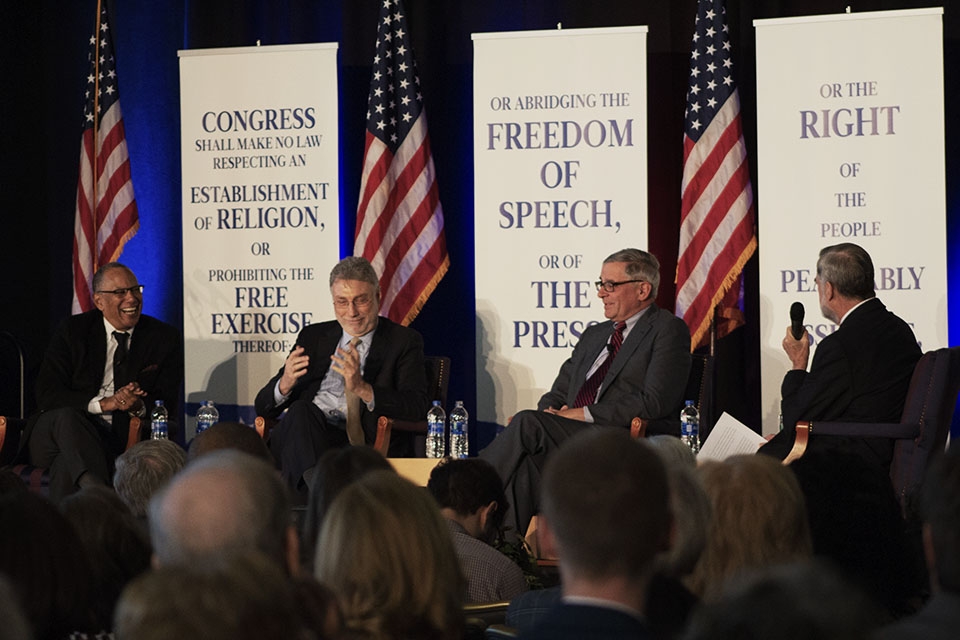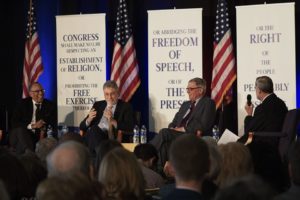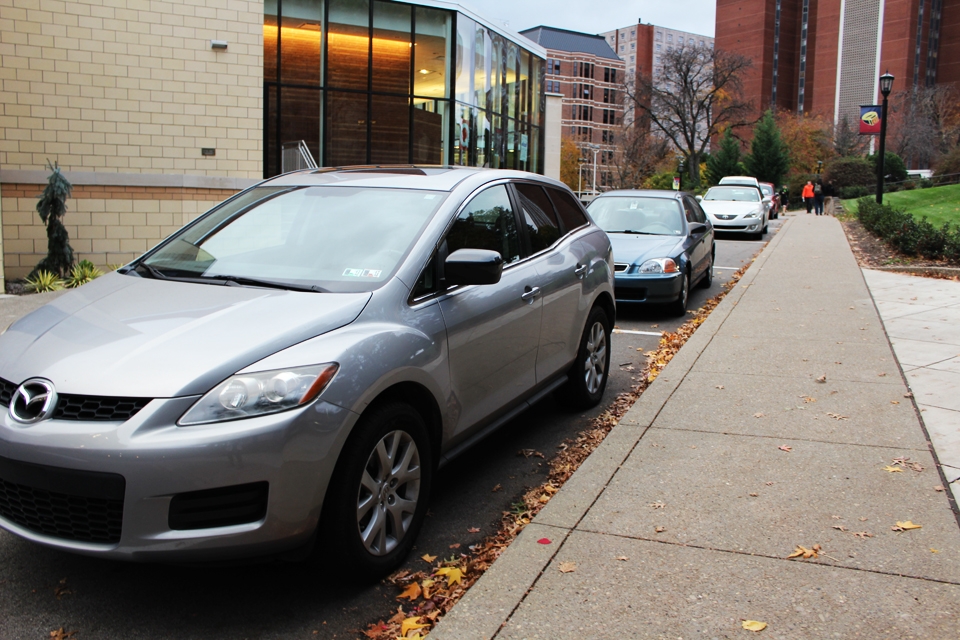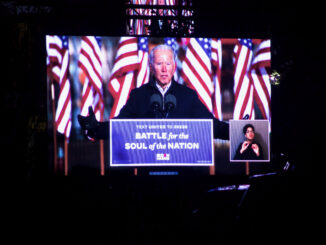
Dean Baquet, executive editor of the New York Times (left); Martin “Marty” Baron, executive editor of the Washington Post (middle) and David Shribman, executive of the Pittsburgh Post-Gazette (right) led a discussion on the importance of free press.

Dean Baquet, executive editor of the New York Times (left); Martin “Marty” Baron, executive editor of the Washington Post (middle) and David Shribman, executive of the Pittsburgh Post-Gazette (right) led a discussion on the importance of free press.
Raymond Arke | Editor-in-Chief & Kailey Love | Managing Editor
10/25/2018
“Congress shall make no law respecting an establishment of religion, or prohibiting the free exercise thereof; or abridging the freedom of speech, or of the press; or the right of the people peaceably to assemble, and to petition the Government for a redress of grievances.”
These words, first written in 1787 as the first of many amendments to the Constitution that guided our newly founded nation into existence, were celebrated at the first National Conference on the First Amendment hosted on Duquesne’s campus on Oct. 21 and 22. The two-day conference, held by the Pittsburgh Foundation and Duquesne, featured some of the leading voices in the nation on the issue of free speech.
Gen. Michael Hayden, a Duquesne alum and the former director of both the CIA and NSA, participated on one of the panels and spoke highly of the event in an interview with The Duke.
“My wife Jeanine and I are both graduates of Duquesne — we were very happy to come back and contribute,” Hayden said. “We attended most of the first day and most of this morning, not just my panel, and it was fascinating. Each step of the way there was something new to learn, so we really enjoyed it.”
Jason Willick, assistant editorial features editor for The Wall Street Journal, said that this was his first time in Pittsburgh and he enjoyed discussing the topics.
“I’ve been interested in First Amendment issues for a long time. It seems like there’s a First Amendment culture in Pennsylvania,” he said in an interview with The Duke. “I’m glad that I came. These are really hard issues. People have to make up their own minds about this stuff.”
Through 17 panels, speeches and presentations — as well as video appearances by John Kasich, governor of Ohio; Alan Dershowitz, Professor of Law Emeritus at Harvard Law School and Ruth Bader Ginsburg, associate justice of the U.S. Supreme Court — former and current government officials, journalists and advocates delved into the First Amendment and its relation to national security, law and the importance of a free press.
Contentious issues at the forefront of the two-day discourse, and the larger national debate, were how “hate speech” and social media fit into the realm of the First Amendment. Questions of how to promote healthy debate between ideologies, in classrooms or on social media, was a main theme throughout discussions.
In an era defined by the unique ways in which we express ourselves through technology, the advent of social media largely dominated discussion throughout various panel topics. With the growing influence of social media in public discourse, many of the panelists worried about its effect on the First Amendment.
Hugh Hewitt, a conservative radio talk show host and MSNBC political commentator, advocated for big changes to how social media operates.
“I’m a huge proponent of ending anonymity online,” he said. “Anonymity is going to kill us because we monetized conflict. Anonymity is the enemy of courage. It will drive people out of the public square.”
Both Hewitt and Juan Williams, a Fox News contributor, agreed that a public utility model has to be implemented to regulate social media companies.
“It’s trust-busting time,” Hewitt said.
Williams noted that, “The people who run these companies are open to regulation. They’ve been cowardly in taking responsibility.”
Yet, Sree Sreenivasan, former professor and associate dean of the Columbia Journalism School, was unsure who should be responsible for that regulation.
“Do we want to hand over to the government the power to decide fake news?” he asked. “Do I want to trust the bros of Silicon Valley?”
Several of the panelists noted that the hope social media would democratize information hasn’t come true.
“There’s a lot of hate speech, fake news,” Willick said. “It’s not going well.”
Along those lines, Tony Norman, a columnist for the Pittsburgh Post-Gazette, said the media has to fight back against the online disinformation efforts.
“We have to acknowledge the fact that our democracy is hackable,” he said. “It’s a 15 alarm fire we have here.”
Social media was also a main point of discussion in the national security panel, in which Gen. Hayden and Tom Ridge, former secretary of the U.S. Department of Homeland Security, addressed how social media divides the public, ultimately threatening security.
Both Hayden and Ridge criticized the algorithms used on social media platforms that create echo chambers and help to reinforce the political polarization in our country. Hayden described this as a phenomenon that “drives you into the deepest corners of your self-identified ghetto.”
A panel of university presidents tackled the idea of “safe spaces” and debate on college campuses, and the challenges they face to promote civil discourse in a highly polarized time. Teresa Sullivan, president emerita of the University of Virginia (UVA), was at the helm when a group of white nationalists marched across the Charlottesville campus in August 2017.
“One of our mistakes was assuming that this group was organized … what do you do when a group of angry and armed men are marching across campus chanting things like ‘Jews will not replace us’?” Sullivan said, while addressing measures that UVA has taken in the wake of the 2017 Unite the Right rally to ensure both student safety and free speech.
Sullivan, and other panelists David Thomas, president of Morehouse College and Robert Zimmer, president of the University of Chicago, all agreed on the fact that there is no way to make students “psychologically safe” on college campuses, and that doing so stymies their education.
“In the college environment, we need clarity about the purpose of education … convincing students that the constant challenging of assumptions and understanding arguments is the core of their education,” Zimmer said.
With the conference coming shortly after the alleged assassination of Washington Post opinions writer Jamal Khashoggi, the topic of how journalism moves forward in a dangerous and ever-changing media world was a common theme.
Amanda Bennett is the director of Voice of America, a U.S. government agency which broadcasts unbiased, factual news into countries with very little press freedom. She described the agency as “basically the United States’ BBC.” Since they employ so many foreign journalists and have seen some of their own killed, she said the death of Khashoggi hit hard.
“What happens with Jamal Khashoggi is not trivial for us,” Bennett said. “These journalists are very, very brave. I worry about it all the time, and we can’t protect them.”
With the great skepticism toward the press from foreign governments and many of the American people, some of the panelists suggested journalists have to become more open to outside examination.
“Journalists have historically been allergic [to transparency],” Nancy Gibbs, former editor of Time magazine, said. “We don’t like letting people in to examine us … There’s room there to be much more transparent.”
Of course, much of the focus surrounding discussions of a free press eventually landed on the idea of “fake news,” a term used by President Trump and members of his administration to discredit not only individual reporters, but entire news outlets.
A panel of executive editors — Marty Baron of the Washington Post, Dean Baquet of the New York Times and David Shribman of the Pittsburgh Post-Gazette — all agreed that though journalism in the era of 5 a.m. tweets from the President could be exhausting, the work was still “gratifying.”
“You wouldn’t want to be an editor in a time when it is quiet, passive, plastic,” Shribman said.
All three editors stressed the need for transparency in the battle against fake news, but not only from government officials. Each outlined ways in which their outlet worked to be transparent with their readers — providing profiles on reporters, creating podcasts to “tell the story behind the story,” making their contact information accessible and reaching out to readers.
“The reader has a large burden to separate responsible from irresponsible media, but we can make it easier for them,” Baquet said of media transparency.
Controversial panelist James O’Keefe, founder of Project Veritas, iterated a similar view on the importance of transparency, though taking a very different approach to it. O’Keefe has received criticism from mainstream media outlets and government officials for his use of undercover tactics and edited videos in his investigative media projects.
“This isn’t about journalism ethics. This is about power,” O’Keefe said. “What matters is what is being exposed.”
The need for a free press was also a main topic in the national security panel, with both Hayden and Ridge voicing strong support for the importance of journalism. Ridge cited the Washington Post’s slogan, “Democracy Dies in Darkness,” as “an absolute truth … I don’t believe democracies can exist without freedom of the press.”
Other panelists included U.S. Solicitor General Noel Francisco, Thomas Hardiman, a judge on the U.S. Court of Appeals for the Third Circuit and twice short-listed for the Supreme Court, Mary Beth Tinker, a First Amendment activist and plaintiff in seminal First Amendment case Tinker v. Des Moines, among many others.




